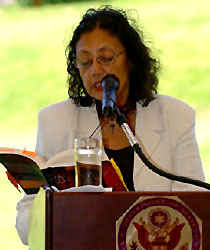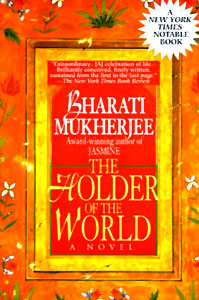"The holder of the world" by Bharati Mukherjee is a remarkable novel where the murmur of history weaves the story. The novel is an ideal unification of the past and the present where the author is seen tracing the story of Hannah Easton, a New Englander, who was ultimately reckoned as the mistress to a Mogul emperor - the holfer of the world. This is a novel of Bharati Mukherjee that deals with transitions in geographical and cultural space - from America to England to India, and as a result of which the personal transformations of a young woman experiences. This is also a novel that moves unobtrusively through time and space. The title mainly concentrates with the theme of the story.
 Born on July 27, 1940 Bharati Mukherjee`s parents were very wealthy named Sudhir Lal and Bina Mukherjee in Calcutta. She learned how to read and write by the age of three. In 1947, she moved to Britain with her family at the age of eight and lived in Europe for about three and a half years. By the age of ten, Mukherjee was determined to become a writer, and had written numerous short stories. After her graduation from the University of Calcutta in 1959 and post-graduation in English and Ancient Indian Culture from the University of Baroda in 1961, she came to the United States of America. Having been awarded a scholarship from the University of Iowa the author did her M.F.A. in Creative Writing in 1963 and her Ph.D. in English and Comparative Literature in 1969. While studying at the University of Iowa, she met and married a Canadian student from Harvard, Clark Blaise, on 19th September 1963. The two writers met and, after a brief courtship, married within two weeks. That`s a memorable stint in Mukherjee`s life. Together, the two writers have produced two books along with their other independent works. Mukherjee`s career a professor and her marriage to Blaise Clark has given her opportunities to teach all over the United States and Canada. Currently she is a professor at the University of California, Berkeley.
Born on July 27, 1940 Bharati Mukherjee`s parents were very wealthy named Sudhir Lal and Bina Mukherjee in Calcutta. She learned how to read and write by the age of three. In 1947, she moved to Britain with her family at the age of eight and lived in Europe for about three and a half years. By the age of ten, Mukherjee was determined to become a writer, and had written numerous short stories. After her graduation from the University of Calcutta in 1959 and post-graduation in English and Ancient Indian Culture from the University of Baroda in 1961, she came to the United States of America. Having been awarded a scholarship from the University of Iowa the author did her M.F.A. in Creative Writing in 1963 and her Ph.D. in English and Comparative Literature in 1969. While studying at the University of Iowa, she met and married a Canadian student from Harvard, Clark Blaise, on 19th September 1963. The two writers met and, after a brief courtship, married within two weeks. That`s a memorable stint in Mukherjee`s life. Together, the two writers have produced two books along with their other independent works. Mukherjee`s career a professor and her marriage to Blaise Clark has given her opportunities to teach all over the United States and Canada. Currently she is a professor at the University of California, Berkeley.
Synopsis:
 `The holder of the world is a daring novel of ideas, travel and history. Mukherjee interweaves the story of a modern American researcher with the travels of her 17th-century ancestor who roamed through Mughal India. This story tells the tale of Beigh Masters who is an `asset-hunter` in search of a legendary diamond from India, The Emperor`s Tear. Her research leads to a connection with a distant relative, Hannah Easton, who lived in Salem, Mass., in the 1670`s. Now fascinated by her own familial ties, Beigh traces Hannah`s life from New England to the Coromandel Coast and the powerful East India Trading Company. Most extraordinary all of a sudden Hannah becomes the "Salem Bibi", the white lover of a Hindu Raja, carving herself a place in history. The novel is brilliantly themed that this reader was guided through a journey of staggering originality all through the book. Beigh`s lover or companion, Venn, is developing a computer program that would allow an individual to experience a few moments in the past, set to a specific time frame, with pertinent information entered into the program. Beigh provides the structural facts, creating the opportunity to be in that time.
`The holder of the world is a daring novel of ideas, travel and history. Mukherjee interweaves the story of a modern American researcher with the travels of her 17th-century ancestor who roamed through Mughal India. This story tells the tale of Beigh Masters who is an `asset-hunter` in search of a legendary diamond from India, The Emperor`s Tear. Her research leads to a connection with a distant relative, Hannah Easton, who lived in Salem, Mass., in the 1670`s. Now fascinated by her own familial ties, Beigh traces Hannah`s life from New England to the Coromandel Coast and the powerful East India Trading Company. Most extraordinary all of a sudden Hannah becomes the "Salem Bibi", the white lover of a Hindu Raja, carving herself a place in history. The novel is brilliantly themed that this reader was guided through a journey of staggering originality all through the book. Beigh`s lover or companion, Venn, is developing a computer program that would allow an individual to experience a few moments in the past, set to a specific time frame, with pertinent information entered into the program. Beigh provides the structural facts, creating the opportunity to be in that time.
The holder of the world is a novel by Bharati Mukherjee that is published by the Ballantine Books in 1994.
`The holder of the world` is not the usual `time-travel` type of story. It is the Virtual participation in real time. Mukerjee actually ties the threads of history together, from one side of the world to the other, suggesting infinite permutations. This is not the traditional historical novel, but Mukerjee fashions an ending worthy of any mystery-adventure. This story experiences an adventure in itself.



















